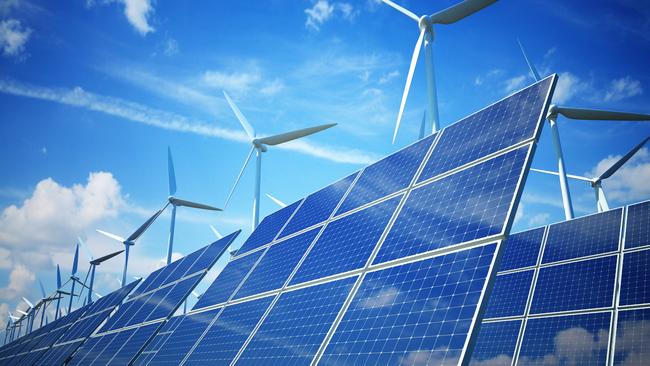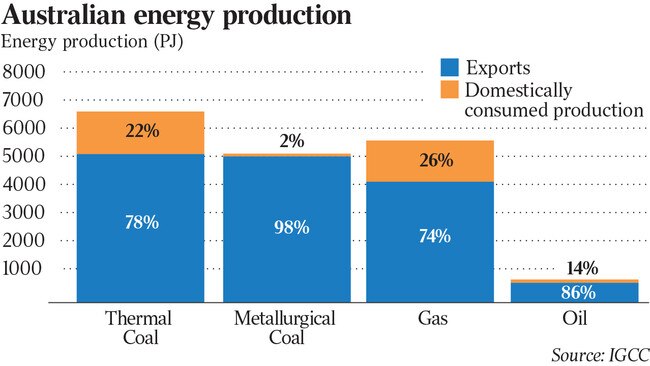Investors say climate targets will trigger ‘investment wave’
Funds controlling trillions of dollars in assets say they need the certainty of long-term climate targets before they commit to large-scale investment.

Business
Don't miss out on the headlines from Business. Followed categories will be added to My News.
A wall of investor money has called on the Morrison government to urgently adopt medium and long-term emissions reduction targets, after Josh Frydenberg supported a net zero by 2050 commitment and warned against allowing markets to “falsely assume” the nation was not decarbonising in line with the rest of the world.
Investors welcomed the Treasurer’s landmark speech on Friday, but said the current lack of any official roadmap or 2050 commitment in line with the Paris Agreement fanned uncertainty and discouraged the deployment of billions of dollars of capital into lifelong assets.
“Yes, the corporate sector and investors are getting on with it in the absence of policy but it puts the breaks on what we can do,” chief executive of the $2 trillion Investor Group on Climate Change, Rebecca Mikula-Wright told The Weekend Australian.
“It’s always been urgent but it’s even more urgent now, because we have to be able to invest with certainty for the long term if we’re going to invest billions of dollars in capital.
“We need to ramp up and do more at an accelerated pace in this critical decade – 2030 is the new 2050.”

Signatories to the Paris Agreement in 2015 pledged to limit the increase in global warming to 2C above pre-industrial levels, and strive to cap the increase at 1.5C.
A sense of urgency has been fanned by a warning from the Intergovernmental Panel on Climate Change last month that the prospect of limiting global warming to 1.5C would be out of reach within 12 years at current rates of greenhouse gas emissions.
Pressure on Australia has also been intensifying, with more than 70 per cent of our two-way trade now with countries committed to net zero emissions by or near mid-century.
Australian Council of Superannuation Investors CEO Louise Davidson, who speaks on behalf of 34 Australian and international funds with more than $1 trillion under management, also welcomed Mr Frydenberg’s speech.
It was “positive”, Ms Davidson said, to hear signals in support of net zero from the Treasurer in the lead-up to the United Nations climate conference in Glasgow in November.
“For a number of years global investors, including Australian superannuation funds, have been focused on the risks associated with climate change and maximising the opportunities from transitioning to a low-carbon economy,” she said.
Mr Frydenberg told Australian Industry Group members on Friday that the nation, as a significant importer of capital with $4 trillion in foreign investment, had a lot at stake in the global climate transition.
The big four banks each sourced about $30bn in annual wholesale funding, and close to half of Commonwealth Government bonds were held by foreign investors.
Reduced access to capital markets would increase borrowing costs, affecting interest rates on home loans and small business loans, as well as the financial viability of large-scale infrastructure projects.
The Treasurer’s assessment echoed commentary by Commonwealth Bank head of institutional Andrew Hinchliff, who appeared before the joint committee on trade and investment growth, chaired by maverick LNP backbencher George Christensen, earlier this month.
Mr Hinchliff said there was “absolutely” a risk to CBA if it failed to respond to the shift in global capital towards funds with ESG (environmental, social and governance) mandates.
“As we think about financing companies these days, and we speak to a lot of investors who are prospective financiers of our company through debt markets, the wall of money that is moving into green mandates is significant, and way larger than potentially the supply of green or sustainable assets that are coming out,” Mr Hinchliff said.
“I think the critical mass of money is certainly moving to that, and the expectations are high on us as well as our clients.
“So the risk for us is funding and capital dries up, not necessarily instantaneously but over time you’d expect your cost of capital to be affected by that.
“It’s a financial risk to the bank if the risk management framework around our risks is poor.”
Sonya Sawtell-Rickson, chief investment officer at the $65bn industry fund HESTA, said on Friday it was great that the government had finally acknowledged that climate change was a “clear and present financial risk”.
However, she agreed that interim targets – or a road-map to net zero by 2050 – were “definitely” needed.
“It’s great to have a long-term target but you need a road-map to achieve it,” Ms Sawtell-Rickson said.
The financial risks of climate change are generally broken down into three categories.
First, there’s the short and long-term physical risks to assets from extreme weather events or supply-chain disruption.
Transition risks, on the other hand, are created by policy, legal, technology and market changes to mitigate and adapt to climate change.
These risks are considered to be significant for some Australian companies, with decarbonising of the global economy likely to lead to large adjustments in the value of fossil fuel companies.
Finally, there’s the risk of climate change-related litigation against governments and private companies, including directors.
There are also opportunities in the transition to a low-carbon economy.
Economic analysis by the IGCC showed there would be big economic gains if Australia adopted a 2030 emissions goal consistent with the Paris Agreement, a net zero commitment for 2050, as well as supporting policies.
The analysis showed the nation could unlock $131bn in additional investment and job opportunities up to the end of the decade.
Much of it would be located in regional Australia.
Originally published as Investors say climate targets will trigger ‘investment wave’



